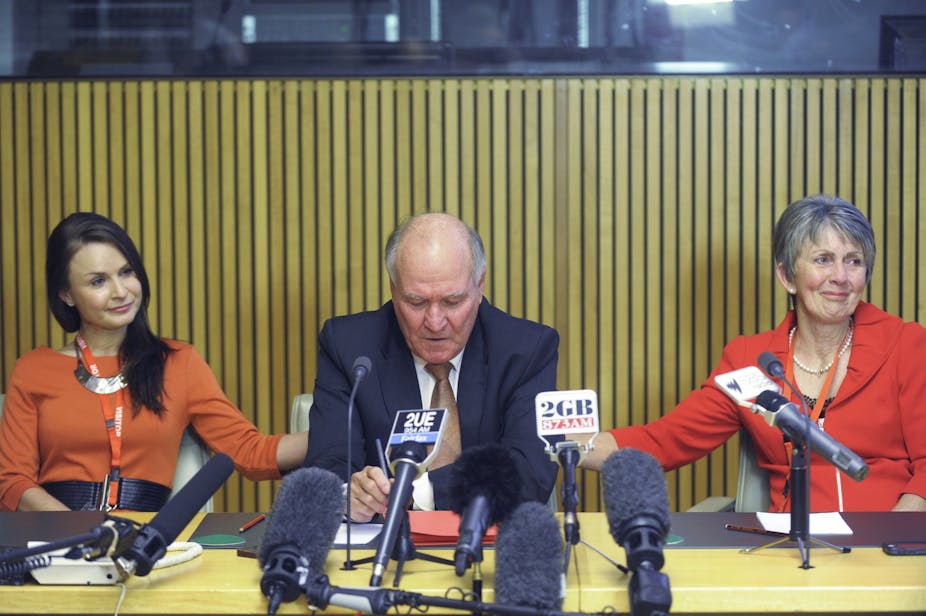The two country independents on whose support the Gillard government has depended - Tony Windsor and Rob Oakeshott – both announced this morning that they will quit politics at the election.
As the Labor Party gears up for a likely showdown between Julia Gillard and Kevin Rudd the pair also raised the issue of whether Rudd would be under threat in a parliamentary no-confidence motion if he became leader.
Windsor, member for New England since 2001, said he had a “health issue” which was currently being investigated, and his family did not want him to stand.
In an emotional press conference, Windsor, who has been in a bitter battle for his seat against Nationals’ Senate leader Barnaby Joyce, said the irony was opinion polling was showing he would probably retain his seat, but the point was that “I don’t want to be here in three years time”.
His decision guarantees Joyce’s move to the House of Representatives.
Earlier, he said that if Labor switched to Rudd it was “probably more likely than not” that he would support a motion of no confidence if it were moved in the parliament.
Windsor said the choice after the election, when he and other crossbenchers had been deciding who to support, had been between Julia Gillard and Tony Abbott. If Gillard were removed “my natural inclination would be to go to the second-place getter”.
Windsor told Gillard of his decision at a meeting on Tuesday night.
Oakeshott, who entered federal parliament through a by-election in 2008, was likely to be defeated in his NSW Mid North Coast seat of Lyne, which is now a virtual certainty for the National Party to win.
“The demands on an independent MP in a regional seat are very high. It’s for this reason that I cannot bring myself to commit to the coming three years,” he said in a statement.
Oakeshott said he was pleased the parliament had run a full three years, supply had been delivered and confidence in the parliament had also been delivered.
“I am obviously disappointed this parliament could not resolve the politics of refugee policy that continues to dress itself as border security - but I did what I could to try to resolve it,” he said.
Asked about his stand on a no confidence motion he said: “It is about policy on the floor of the parliament. If Kevin Rudd or any other candidate wants to win my support either now or after some event, put your ideas on the floor of the parliament.”
As speculation intensified that there will be a petition for a special caucus meeting on the leadership, senior cabinet supporters of Gillard increased the pressure on Rudd.
Trade minister Craig Emerson said Rudd had earlier declared categorically that he would not challenge.
Emerson also dismissed suggestions that if there were a special meeting Gillard would force MPs to vote in a show of hands motion for a spill.
Climate Minister Greg Combet said: “The ball’s in Mr Rudd’s court. No one knows whether he is going to challenge.” Combet said the leadership had to be resolved, but he would not sign a petition for a special caucus meeting.
“The Prime Minster is not going to stand down,” Combet said.
“I support the Prime Minister.”
Greens leader Christine Milne said that in the hung parliament, the Labor Party could not determine who was the prime minister.
The ALP could determine who led it, but the parliament determined who was PM - “or you go to an election”.
“It’s the parliament or the people,” Milne said.
The choice was getting the confidence of the house or an early election, but she did reiterate that the Greens would not facilitate Abbott becoming prime minister.
Bob Katter, of Katter’s Australian Party, promised that if Labor changed leaders he would back Rudd in a motion of no confidence. He said this was not in his parties interests but would be in the nation’s interests.
Katter who is a personal friend of Rudd’s, said he was making his statement before any caucus meeting so that Labor MPs had a clear indication of what he would do.
“If they vote for him, they will get a vote of confidence on that basis,” he said.
He said he had reached the conclusion that the government “bus is not under anybodies control”.
Meanwhile, Rudd is going ahead with preparations for his trip to China this week. A statement from his office said, “Mr Rudd will travel to China to attend an international conference in Beijing on Friday morning. Mr Rudd has had his leave request approved from Thursday afternoon.
"Mr Rudd accepted the invitation to speak at the conference a number of months ago.”

